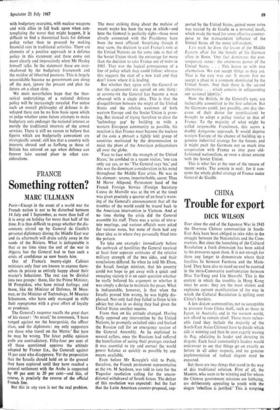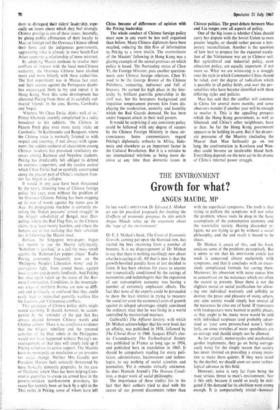Trouble for export
CHINA DICK WILSON
Ever since the end of the Japanese War in 1945 the Overseas Chinese communities in South- East Asia have been obliged to take sides in the struggle between the Nationalists and the Com- munists. But since the launching of the Cultural Revolution a fresh dimension has been added to the pressures upon them. It is not enough for them any longer to demonstrate where their loyalties lie between Formosa and the Main- land. They have also to stand up and be counted in the intra-Communist confrontation between Mao Tse-Tung and Liu Shao-chi. This is the context in which the troubles in Hong Kong must be seen: they are the most violent and explosive current manifestation of the way in which the Cultural Revolution is spilling over China's borders.
A few distant communities, not so susceptible to pressure from China itself, such as those in Japan, in Australia and in the western world, can afford to remain aloof. Those more vulner- able (and they include the majority of the South-East Asian Chinese) have to decide which side is winning and then be seen eagerly waving its flag, adulating its leader and shouting its slogans. Each local community's leaders would endeavour to see that things go• on exactly as before in all other respects, and no genuine implementation of radical slogans need be expected.
But there are two things that stand in the way of this traditional solution. First of all, the Maoists, who seem to be winning and for whom the Chinese government missions are lobbying, are deliberately appealing to youth with the slogan 'rebellion is justified.' This is tempting them to disregard their elders' leadership, espe- cially on issues about which they feel strongly. Chinese prestige is one of these issues. Secondly, by giving public affirmation of their loyalty to Mao on foreign soil the Overseas Chinese offend their hosts and the indigenous governments, aggravating what is already in most South-East Asian countries a relationship of tense mistrust.
By adopting Maoist methods to resolve their conflicts of interest with the local non-Chinese authority, the Overseas Chinese have clashed more and more bitterly with these authorities. The first experiment was in Macao last year, and their success against the Portuguese doubt- less encouraged them to try and repeat it in Hong Kong. Now this same development has alienated Peking from three of its carefully cul- tivated 'friends' in the area, Burma, Cambodia and Nepal.
'Whereas Mr Chou En-lai thinks well of us,' Prince Sihanouk recently complained in a radio broadcast to his subjects, 'the Chinese in Phnom Penh play even more nasty tricks on Cambodia.' In Kathmandu and Rangoon, where the Chinese voice is normally listened to with respect and courtesy, if not always with agree- ment, the sudden outburst of chauvinism among Chinese residents has provoked retaliatory ex- cesses among Burmese and Nepalese students. Peking has predictably felt obliged to defend its overseas supporters, and the cordon conical which Chou En-lai had so carefully constructed along the greater part of China's southern fron- tier has begun to collapse.
It would in any case have been threatened by the newly thrusting tone of Chinese foreign policy this year, even without the problem of the Overseas Chinese. Peking has been stepping up its war of words against the status quo in Asia. Its propaganda machine is currently ex- tolling the 'Indian peasants' armed struggle' in the Siliguri sub-district of Bengal, near Dar- jeeling. where the Red Flag flies, so the Chinese claim, in at least twenty hamlets, and where the Indians are at last realising that their salvation lies in following the Maoist road.
Barisan, the Singapore newspaper, began last month to use the Maoist rallying-cry, 'Rebellion is justified,' in a call for mass revolt against the 'Rahman-Lee puppet clique.' Radio Peking comments frequently now on the 'Philippine People's Liberation Army' and its courageous fight. from armed bases, against local Ty rants and despotic landlords. And Peking has once again taken up the cause of the Bur- mese Communists. Conditions in the mountain- ous areas of northern Burma are now so diffi- cult and politically so confused that they could easily lead to intensified guerrilla warfare like the Laotion and Vietnamese conflicts.
This catalogue of Chinese policy shifts might sound alarming. It should, however, be accom- panied by the reminder of the gap that has always existed between Chinese words and Chinese actions. There is no conclusive evidence that the Siliguri rebellion and the renewed activities of the Huk rebels in the Philippines would not have happened without Peking's en- couragement, or that they will simply fold up if Peking withdrew its active support. The Maoists have no monopoly on revolution or on pressure for social change. Neither Mrs Gandhi nor President Marcos feels seriously threatened by these basically domestic pinpricks. In the case of Thailand. where Mao has been helping.Com- munist euerrillas to create an armed base in the poverty-stricken north-eastern provinces, his cause has recently been set back by a split in the Thai exiles in Peking, some of whom have left China because of differences of opinion with the Peking leadership.
The whole conduct of Chinese foreign policy must now in any event be less well organised than before. Many Chinese diplomats have been recalled, reducing the thin flow of information to Peking to a mere trickle. The overestimate of the Maoists' following in Hong Kong was a glaring example of the unreal premises on which policy is based. The fluctuating status of Chen Yi, the Foreign Minister, puts another question- mark over Chinese foreign relations. Chen Yi used to be the George Brown of the Chinese Politburo, endearing, indiscreet and full of bravura. He earned his high place in the hier- archy by brilliant guerrilla generalship in the civil war, but his bourgeois background and impulsive temperament prevent him from dis- playing the moderation, austerity and humility which the Red Guards demand. He has been under frequent attack in their wall posters.
It would be surprising if any consistent policy could be followed with any degree of success by the Chinese Foreign Ministry in these cir- cumstances. Some commentators regard Peking's diplomatic setbacks in Africa, Indo- nesia and elsewhere as an important factor in the Cultural Revolution. But it is a mistake to see international relations as being more de- cisive at any time than domestic issues in Chinese politics. The great debate between Mao and Liu ranges over all aspects of policy.
One of the big issues is whether China should .carry her dispute with the Soviet Union to even - greater lengths, or should rather pursue a tem- porary reconciliation. Another is the question of how best to prepare for the expected escala- tion of the Vietnamese war on to Chinese soil. But agricultural and industrial policy, even education policy, are equally important, if not more so. What we are witnessing is a struggle over the style in which Communist China should be ruled, over the degree of radicalism which is possible in all policy fields, and over the per- sonalities who have become identified with these differing styles and policies.
Mao has said that the conflict will continue in China for several more months, and some observers wonder if another year will be enough to resolve it. This is the appalling prospect ,which the Hong Kopg government, as well as Sihanouk and China's other neighbours, have to face. So far the Hong Kong government appears to be holding its own. But if the desper- ate pressures of the Maoists (including the Mao-er than Mao hotheads) go on too long, the confrontation in Kowloon and Wan- chai could become an intolerable blood bath. Everything depends on the next act in the drama of China's internal power struggle.































 Previous page
Previous page